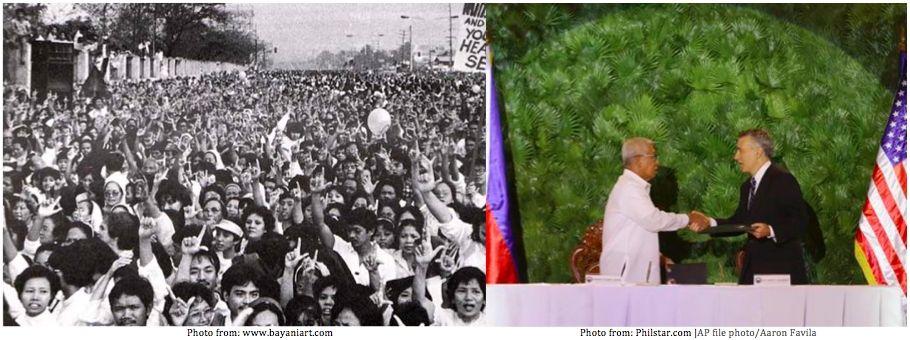
Catharsis. Emotional release, relief, venting. Purging, purification, cleansing. Renewal. The Filipino drama.
February 2016 marks the 30th anniversary of the so-called EDSA Revolution, the overthrow of the authoritarian rule of Ferdinand Marcos. He was president from 1965 until 1986, altogether 21 years. Before Marcos, 21 years would have meant five presidents governing. After Marcos, it would have meant three and a half presidents, except that Gloria Arroyo had all the luck, and Erap Estrada none.
Mahathir Mohamad was prime minister for 22 years. Lee Kwan Yew had 31 years; Suharto as well, 31. This year, Hun Sen of Cambodia will beat the record and become the longest serving leader in our part of the world, save for the imperial dynasties perhaps. Even Mao Zedong only had about 27 years to shape “new China”.
So of course, good things happened during those 21 years under Marcos. But horrible things happened in the last 14 of those years, since the imposition of Martial Law in 1972. So horrible that the Filipino people decided 30 years ago that they had had enough. The numbers of insurgents and secessionist movements had swelled. There were so many excesses and abuses that even elements of the military and the elite turned against the regime. Therefore, EDSA. Therefore, catharsis.
But do we remember how hard so many people fought to win back democracy and to reclaim our human rights? The lesson we need to learn is not how to remember the good old days and the bad old days of Martial Law. The lesson that we need to understand is how and why, in the last 30 years, we failed to develop a strong and effective democracy that we can all now have faith in. The question that we need to ask is how and why respect for human rights and respect for human dignity are not yet internalized in our culture and value system, when they could have become – after Martial Law - second nature to Filipinos.
September this year will also mark 25 years since the Philippine Senate voted to end nearly a hundred years of American military presence in the country (winning by a slim 11-10 majority). Such presence was first established at the end of the Spanish-American War, after the United States had bought the Philippines from Spain for twenty million dollars. Of the Senate vote in 1991, one Senator waxed eloquent and said: “It is a vote for a truly sovereign and independent Philippine nation". "It is a vote to end a political adolescence tied to the purse strings of America -- a crippling dependence." That vote, catharsis.
But do we, 25 years hence, remember the intense debates about whether foreign bases were still needed by both sides following the end of the Cold War, and whether we were willing to bear the costs (social, political as well as financial) of sustaining an unequal alliance relationship? Do we remember the years that followed when the erstwhile “special relations” nearly ground to a screeching halt, because a piqued Big Brother turned off not just the tap of military assistance but of economic aid and investments as well.
The lesson that we need to learn is not necessarily how sorry we should be for misguidedly thinking that we even stood a chance of defending ourselves against would-be adversaries without the backing of Big Brother, as many have argued. The question that we need to be asking ourselves is why, in the 25 years that have passed, have we not done enough to enable ourselves to stay true to that fateful choice in 1991 of reducing dependence on foreign military protection. Perhaps by developing our own credible and self-reliant defense capability. Or by diversifying security partners, aside from the U.S., so as to reduce reliance on any single one. Perhaps by committing more deeply to waging internal peace, thereby allowing our armed forces to address their true mission of external defense. Or by persistently engaging in sustained and effective regional diplomacy, in order to reduce threats and create incentives for cooperation among our neighbors. And by focusing on our economic, social, and political development, in the process reducing vulnerabilities to any external aggression.
Perhaps we tried, but failed. Perhaps we are still trying, and much remains to be done. Therefore, EDCA.
Are we correctly valuing the lessons of our history? What is our next catharsis?
---
EDSA – refers to the people power movement that raged for three years and toppled the Marcos dictatorship in 1986, but also the long, dark period of struggle against a corrupt, unjust and abusive order that prevailed then.
EDCA –the 2014 Philippines-United States Enhanced Defense Cooperation Agreement that would allow U.S. troops rotational access and prepositioning of materiel within Philippine military facilities in eight different locations in the country.
